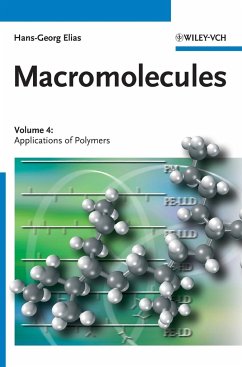"Macromolecules" provides a broad survey of the entire subject; integrated representations of chemistry, physics, and technology; precise descriptions and definitions of basic phenomena; and balanced treatments of facts and theory. The book series thus intends to bridge the gap between introductory textbooks and the highly specialized texts and monographs that cover only part of polymer science and technology.
Volume I is concerned with the fundamentals of chemical structure and principles of synthesis of macromolecules: constitution, configuration, conformation, polymerization equilibria, polymerization mechanisms (ionic, coordination, free-radical, step reactions, including solid-state and biochemical polymerizations), polymer reactions, and strategies for defined polymer architectures.
Volume II discusses individual polymers and their industrial syntheses, Volume III the fundamentals of physical structures and properties, and Volume IV the processing and application of polymers as plastics, fibers, elastomers, thickeners, etc.
The world of macromolecules in a nutshell.
Volume I is concerned with the fundamentals of chemical structure and principles of synthesis of macromolecules: constitution, configuration, conformation, polymerization equilibria, polymerization mechanisms (ionic, coordination, free-radical, step reactions, including solid-state and biochemical polymerizations), polymer reactions, and strategies for defined polymer architectures.
Volume II discusses individual polymers and their industrial syntheses, Volume III the fundamentals of physical structures and properties, and Volume IV the processing and application of polymers as plastics, fibers, elastomers, thickeners, etc.
The world of macromolecules in a nutshell.
There is nothing like colleagues' comments to recommend a book:
'The books by Hans-Georg Elias have in the meantime become a brand for quality when it comes to macromolecular chemistry - and this not only because of the competent approach but also because of their high relevance to practice. The books are a must for every lab, even for those only marginally occupied with polymers! Kleben + Dichten Adhäsion
'Polymer Scientists - starting with PhD students - in academia and R&D will profit from the wealth of information on chemical structures and syntheses of polymers. This handbook should be present in every library of polymer institutes. May its frequent use compensate for the enormous effort of both author and publisher!' Journal für Praktische Chemie
'THE 'Elias' is a classic for macromolecular chemistry - seen both as demanding textbook as well as recommended for deepening knowledge. At this point please allow the question: Why is this work published in German? In summary: The present work is not always easy to read but a profound source of wisdom.' Angewandte
'The work is seen as source of solid and sound knowledge which will not be easily replaceable through any other, similar publication.' Wissenschaftliche Nachrichten
'The work captivates through its precise (handbook-like) presentation of details. On the other hand, the author presents the subject in the context as in good textbooks. One can only congratulate the author for having provided this comprehensive presentation of macromolecular chemistry.' Starch/Stärke
'.. a work those involved in macromolecular science cannot do without.' Arzneimittel-Forschung/ Drug Research
'The reader will find a brilliant introduction to the physics of polymers - indispensable basics for well versed handling of polymers.' Nahrung/ Food
'The fact that this legendary series on macromolecules is being published in its sixth edition speaks for itself.' KU - Kunststoffe
'The books by Hans-Georg Elias have in the meantime become a brand for quality when it comes to macromolecular chemistry - and this not only because of the competent approach but also because of their high relevance to practice. The books are a must for every lab, even for those only marginally occupied with polymers! Kleben + Dichten Adhäsion
'Polymer Scientists - starting with PhD students - in academia and R&D will profit from the wealth of information on chemical structures and syntheses of polymers. This handbook should be present in every library of polymer institutes. May its frequent use compensate for the enormous effort of both author and publisher!' Journal für Praktische Chemie
'THE 'Elias' is a classic for macromolecular chemistry - seen both as demanding textbook as well as recommended for deepening knowledge. At this point please allow the question: Why is this work published in German? In summary: The present work is not always easy to read but a profound source of wisdom.' Angewandte
'The work is seen as source of solid and sound knowledge which will not be easily replaceable through any other, similar publication.' Wissenschaftliche Nachrichten
'The work captivates through its precise (handbook-like) presentation of details. On the other hand, the author presents the subject in the context as in good textbooks. One can only congratulate the author for having provided this comprehensive presentation of macromolecular chemistry.' Starch/Stärke
'.. a work those involved in macromolecular science cannot do without.' Arzneimittel-Forschung/ Drug Research
'The reader will find a brilliant introduction to the physics of polymers - indispensable basics for well versed handling of polymers.' Nahrung/ Food
'The fact that this legendary series on macromolecules is being published in its sixth edition speaks for itself.' KU - Kunststoffe

